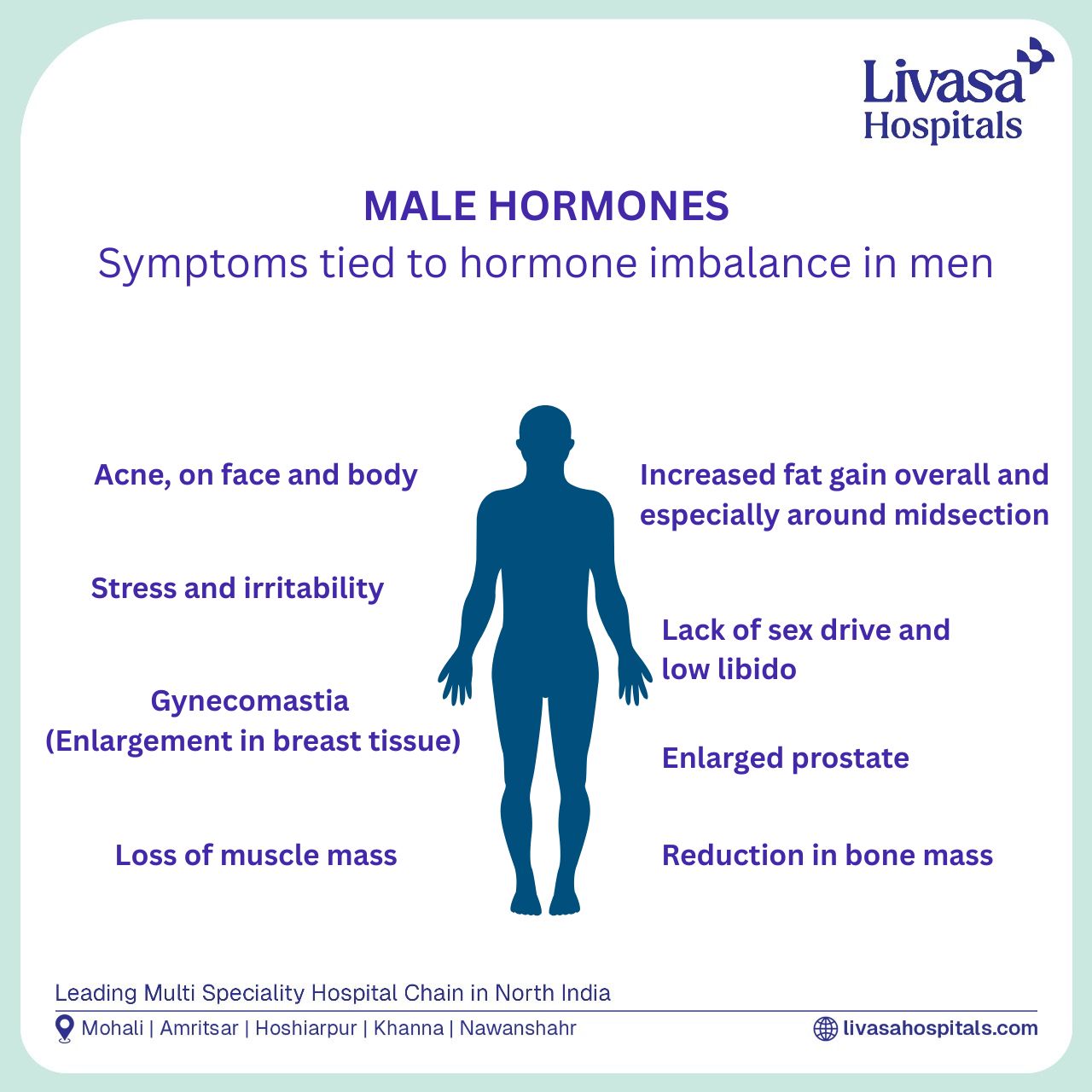03 Feb 2026
Rhinoplasty Revision Surgery in Mohali: Cost When Your First Nose Job Fails


Dr. Avinash Srivastava
04 Feb 2025
Call +91 80788 80788 to request an appointment.
Hormonal Imbalance in Men: Symptoms, Causes, and Solutions
Although hormonal imbalances are often linked to women, men can also experience significant changes in hormone levels that impact their overall health and well-being. Hormones regulate essential bodily functions including metabolism, mood, sexual health, and muscle strength. In men, testosterone is the primary hormone involved, but others such as estrogen, thyroid hormones, and cortisol also play critical roles. Recognizing the signs of hormonal imbalance in men can lead to early diagnosis and effective treatment, preventing long-term health complications.
Common Signs of Hormonal Imbalance in Men
1. Persistent Fatigue and Low Energy
Low testosterone levels are frequently associated with chronic tiredness and lack of energy. Men with hormonal imbalances often struggle with lethargy that doesn’t improve with rest, affecting daily activities and productivity.
2. Unexplained Weight Gain and Fat Accumulation
A drop in testosterone and thyroid hormone imbalances can cause difficulty in losing weight and increased fat deposits, especially around the abdominal area. Reduced muscle mass is also common with hormonal shifts.
3. Decreased Libido and Sexual Dysfunction
Testosterone drives sexual desire in men. Hormonal imbalance often leads to decreased libido, erectile dysfunction, and trouble maintaining erections, impacting intimacy and emotional health.
4. Mood Changes: Irritability and Depression
Hormones influence mood stability. Lower testosterone and higher cortisol levels can cause mood swings, irritability, anxiety, and even depression.
5. Loss of Muscle Mass and Strength
Testosterone supports muscle growth and bone density. Men experiencing a hormonal imbalance may notice muscle loss, decreased strength, and increased susceptibility to fractures.
6. Sleep Problems
Hormonal changes can disrupt sleep cycles, causing insomnia or poor-quality sleep. Cortisol excess may exacerbate sleep disturbances, worsening fatigue and mood issues.
7. Hot Flashes and Excessive Sweating
Though more common in women, men with low testosterone may also experience hot flashes, sudden warmth, and sweating that disrupts sleep and daily comfort.
8. Cognitive Decline and Memory Problems
Hormonal imbalances affect brain function, leading to brain fog, difficulty concentrating, and memory lapses.
9. Reduced Facial and Body Hair Growth
Decreased testosterone can lead to thinning or loss of hair on the face and body, a visible sign of hormonal decline.
10. Higher Risk of Osteoporosis
Testosterone is vital for bone strength. Men with hormonal imbalances are at risk for osteoporosis, increasing the chance of fractures and injuries.

Causes of Hormonal Imbalance in Men
Hormonal imbalances can stem from natural aging, underlying medical conditions (like hypogonadism, thyroid disorders), chronic stress, obesity, poor lifestyle habits, or medication side effects. Identifying the root cause is essential for effective treatment.
Diagnosing and Treating Hormonal Imbalance in Men
Diagnosis typically involves blood tests to measure hormone levels, followed by a customized treatment plan. Treatment options may include lifestyle modifications, hormone replacement therapy, managing underlying health conditions, and stress reduction techniques.
Conclusion
Hormonal imbalance in men is a common but often under-recognized condition that can profoundly impact physical, emotional, and mental health. Symptoms such as fatigue, weight gain, decreased sexual desire, mood instability, and muscle loss should prompt a medical evaluation. Early recognition and treatment can restore hormone balance, improve quality of life, and prevent complications. If you suspect hormone issues, consult a healthcare professional for a thorough assessment.
Rhinoplasty Revision Surgery in Mohali: Cost When Your First Nose Job Fails
Plastic Surgery After Massive Weight Loss: Body Contouring Packages in Mohali
ENT + Cosmetic in Mohali: Septoplasty for Breathing with Cosmetic Rhinoplasty Offers
Livasa Healthcare Group Corporate Office,Phase-8, Industrial Area, Sector 73, Sahibzada Ajit Singh Nagar, Punjab 160071
| Mohali | +91-99888 23456 |
| Amritsar | +91-99887 49494 |
| Hoshiarpur | +91-99883 35353 |
| Nawanshahr | +91-75081 82337 |
| Khanna | +91-98888 05394 |